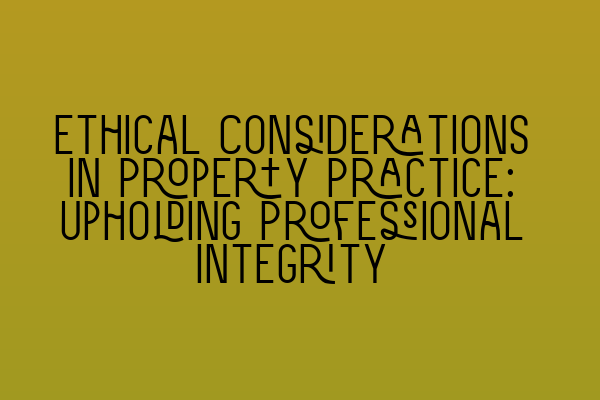Ethical Considerations in Property Practice: Upholding Professional Integrity
As property solicitors, it is crucial for us to not only possess a deep understanding of property law and land law, but also to uphold the highest standards of professional integrity. Our clients place their trust in us to handle their property matters diligently and ethically, and it is our duty to ensure that we meet and exceed their expectations. In this article, we will explore the ethical considerations that property practitioners need to be mindful of in order to maintain their professional integrity.
The Duty of Confidentiality
One of the fundamental aspects of our profession is the duty of confidentiality. We must treat all information shared by our clients as strictly confidential and only disclose it with their consent or as required by law. This duty extends beyond the duration of our engagement with the client, ensuring that their personal and sensitive information remains protected.
In cases where conflicts of interest arise, it is crucial to manage them appropriately to maintain client confidentiality. This may involve refusing representation or obtaining informed consent from all affected parties involved. By doing so, we can demonstrate our commitment to prioritizing the interests of our clients and avoiding any potential breaches of confidentiality.
Conflict of Interest
One of the most critical ethical considerations in property practice is to identify and manage conflicts of interest. A conflict of interest exists when the solicitor’s personal or professional interests may interfere with their ability to provide unbiased advice or representation to a client.
In order to uphold professional integrity, it is essential to identify potential conflicts of interest at the outset of a client engagement. This can be achieved through comprehensive checks and screenings to ensure that no conflicts of interest exist between the solicitor, their firm, and the client. If a conflict is identified, it should be disclosed and addressed transparently, either by obtaining written consent from all parties involved or by declining representation to avoid any compromise in client representation.
Understanding contractual capacity is essential in preventing conflicts of interest. Clients must have the legal competence to enter into contracts and fully understand the rights and limitations associated with it. By guiding clients through these complexities and ensuring their contractual capacity, solicitors can reduce the risks of conflicts arising in the future.
If you want to test your knowledge of contractual capacity, you can take our interactive SQE mock tests for contract law. These tests provide a valuable opportunity to challenge yourself and deepen your understanding of this important area of law.
Furthermore, we invite you to join our SQE contract law webinars, where our experts will share their insights and guidance on mastering the essentials of contract law. These webinars offer a unique opportunity to enhance your knowledge and stay up-to-date with the latest developments in this field.
Professional Competence
Property practitioners have a duty to maintain their professional competence and stay updated with the latest developments in property and land law. This includes attending continuing professional development (CPD) courses, seminars, and conferences to enhance their knowledge and skills.
In addition, solicitors need to be aware of their limitations and seek assistance or advice when dealing with complex or unfamiliar property matters. It is essential to provide clients with accurate and reliable advice, and by recognizing our own limitations, we can avoid potential mistakes or misrepresentation.
Client Care and Communication
Client care and effective communication are key elements of maintaining professional integrity. Solicitors must ensure that clients are well-informed and receive regular updates on their property matters. Clear communication channels and responsiveness are crucial in establishing trust and providing exceptional service to clients.
In addition, it is essential to provide clients with comprehensive advice concerning the potential risks and consequences associated with their property transactions. This includes advising clients on potential legal implications, financial considerations, and any other relevant factors that may impact their interests.
By upholding professional integrity and prioritizing client care and communication, property practitioners can establish strong relationships with their clients and build a reputation of trust and reliability in the industry.
Conclusion
Upholding professional integrity is of utmost importance in property practice. By adhering to the duty of confidentiality, managing conflicts of interest, maintaining professional competence, and prioritizing client care and communication, property solicitors can ensure that they meet and exceed the ethical expectations of their clients.
If you would like further guidance on ethical considerations in property practice or would like to enhance your knowledge on contractual capacity, feel free to explore our related articles:
- Understanding Contractual Capacity: Rights and Limitations
- Interactive SQE Mock Tests for Contract Law: Test Your Knowledge
- Join Our SQE Contract Law Webinars: Expert Insights and Guidance
- SQE Prep: Mastering the Essentials of Contract Law
- Contractual Capacity: Understanding Legal Competence in Contracting Parties
